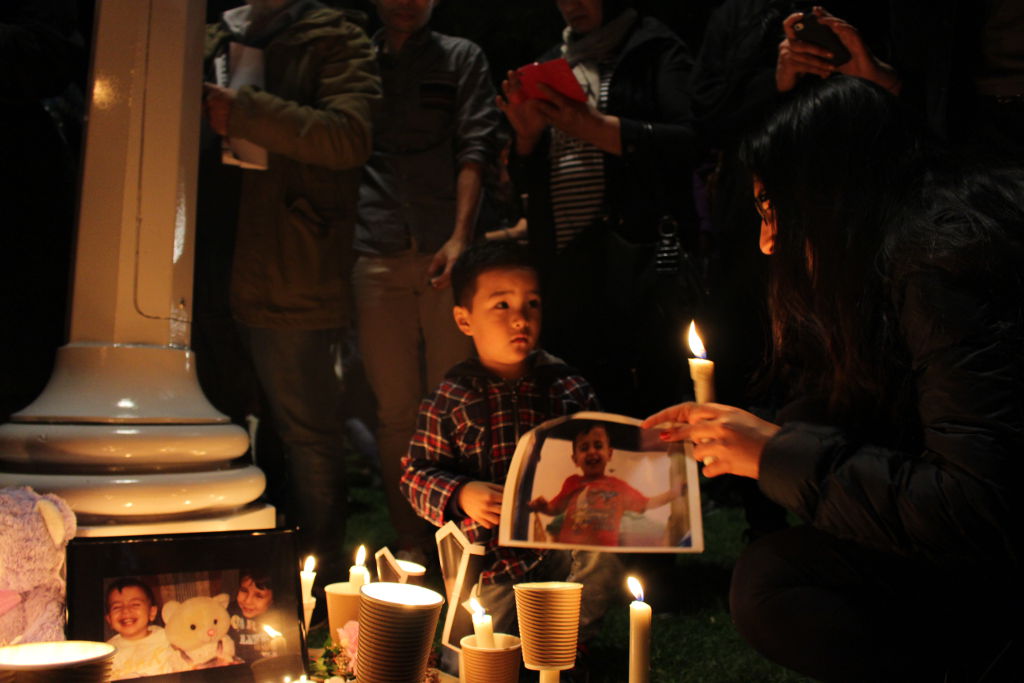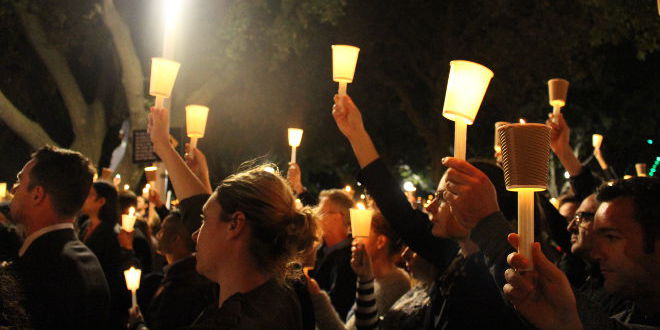As Thousands Rally For Refugees, Australia Faces A Choice Between Selfishness And Compassion
If we're going to honour Aylan Kurdi properly, we have to break down the limits we've put on our compassion.

Last night, along with an estimated 10,000 others, I went to the Light the Dark rally in Sydney’s Hyde Park. As the crowd swelled to dimensions not even the organisers had anticipated, volunteers were flat out making hundreds of the rally’s now-distinctive candle-cups, handing them out to newcomers and lighting them for people.
Those little candle-cups, instantly recognisable now that photos of thousands of them raised in darkness are leading news sites and frontpages across the country, have been common at refugee rallies for a while. They’re simple, evocative and nicely deal with some of the hairier logistical issues of carrying an open flame around. The light of the candle illuminates the paper cup into a kind of impromptu lamp, while the cup catches the melting wax and stops you burning your hand.

I have a little collection of candle-cups now, but I wish I didn’t. Besides the one from last night, I have another two, which came home with me after much smaller Light the Dark rallies last year.
One cup is for Reza Berati, a 23-year-old Iranian man who was beaten to death in Australia’s Manus Island detention camp in February. The other is for Hamid Kehazaei, a 24-year-old Iranian man who died in a Brisbane hospital in September after a cut on his foot went untreated on Manus for a week and became infected.
Those rallies, and the seemingly endless parade of weekend protests demanding an end to Australia’s offshore detention policies, never managed to spur the widespread momentum for action we’ve seen in the wake of Aylan’s death. In a way, that’s understandable. Reza and Hamid were grown men, albeit young ones, and Aylan was a four-year-old boy. We saw no photos of the two men’s deaths, whereas that image of Aylan lying curled up on a beach has seized the collective conscience in a way only images can.
But I can’t help but wonder if this huge outpouring of grief and empathy at Aylan’s death isn’t mixed with a small, shameful sense of relief — relief that, for once, news of a dead refugee isn’t simultaneously a self-evident reminder of how our country treats them. We could never mourn Reza or Hamid in the way we’re mourning Aylan, because it would be impossible to do so without acknowledging that we — through the governments we’ve elected, and our complicity in their policies — played a significant role in their deaths.
This is not to discount the compassion so many Australians have shown over the last week. Rather, it is to encourage it. Two weeks ago it was unimaginable that a Coalition politician would propose we take in up to 50,000 Syrian refugees, or the Herald-Sun would demand on its front page that we let refugees in.
“Let them in” – front page of tomorrow’s @theheraldsun pic.twitter.com/2kTZXHUuqN
— Rob Harris (@rharris334) September 7, 2015
But the fact that such gestures are so far outside the norm is kind of the point. Our compassion should not have limits, but we know from long and bitter experience that it does. Hundreds of kids like Aylan — and adults like Reza and Hamid — continue to be exposed to sexual abuse, the threat of violence and the slow-burn torture of growing up behind bars in our offshore detention camps. Less than a year ago, we were sending refugees on Manus Island back to Syria, despite knowing it could quite possibly mean their deaths.
We often forget about those we’re mistreating, because we’ve allowed the government to place them out of sight where they can’t make us uncomfortable. Journalists are not allowed into detention camps. Detention workers who speak out about what they see can face up to two years jail. The Minister for Immigration refuses to answer even the most basic questions about the fates of asylum seekers, citing the convenient cop-out that is “on-water matters,” and our collective outrage is nowhere.
We’ve been conditioned into apathy, and we’re struggling to break our old habits. Even now, so many of us are scrambling to put caveats and qualifications on any threatened outbreak of humanitarianism. Tony Abbott’s first response to Aylan’s death was to claim he had died at sea “in illegal migration”. It was a grotesque and factually incorrect assertion, but it was consistent with the Prime Minister’s longstanding tactic of describing asylum seekers who come by boat as “illegals”.
True to form, given our history, many are using the crisis as an excuse to stir up bigotry lazily disguised as compassion. Public figures like commentator Paul Sheehan, Sydney Catholic Archbishop Anthony Fisher, Pauline Hanson and Senator Cory Bernardi have demanded we prioritise Syrian Christians in any intake — the obvious implication being that the millions of Syria’s Muslims caught between the murderous barbarity of ISIS and the state-ordained massacres of the Assad regime are less worth saving. One wonders if these people would support a humanitarian response at all if Christians weren’t among those at risk.
'Do you accept Jesus Christ as your personal Lord and Saviour' is a pretty radical addition to documentation of seeking asylum.
— Hipstorian (@ottomanscribe) September 8, 2015
It should be noted that such proposals have not gone unchallenged. The Sydney Morning Herald has come out strongly, declaring that “Australia should not determine which victims of this crisis are worthy of our support purely on some perception that we might import sectarian conflict,” and urging the government to take in refugees of all faiths and none. On Q&A last night Shadow Treasurer Chris Bowen and NSW Premier Mike Baird rightly pointed out that Syrian Christians and other persecuted minorities will naturally feature heavily in any Australian refugee intake, and emphasised that “everyone matters”.
.@Bowenchris says while refugee intake should be non-discriminatory. @mikebairdMP & Robertson agree #QandA http://t.co/gfROrya101
— ABC Q&A (@QandA) September 7, 2015
But the government appears to be giving in — again — to its worst instincts, with senior ministers advocating for Christians to be placed at the front of the queue. Where other nations have accepted hundreds of thousands of Syrians and welcomed them with hugs and hot drinks at train stations, Australia dithers, openly wondering whether we should increase our paltry humanitarian intake at all. Labor has called for Australia to take 10,000 refugees, but hasn’t explained why Aylan and his fellow refugees need our compassion and help today when they needed to be indefinitely locked up in offshore camps two weeks ago.
Our leaders have taken the road of brutality and suspicion, of dehumanisation and “deterrence”, for more than twenty years, and this is the result. Our natural instinct to help people in need has been blunted by the hostility and fear we’ve been taught to feel for those same people, even when we’re confronted by the tragic and inevitable consequences of that mindset. To fully embrace compassion for Syria’s refugees would be to make a lie of Stop The Boats, of “we will decide who comes to this country and the circumstances in which they come,” and many are not ready for the cognitive violence of that realisation.
This past week has seen the cautious emergence of what could become a new national mood, even in high places, but if it isn’t seized we’ll lose an opportunity that may not come again for a long time. We are in unusual circumstances, and our long-entrenched prejudices and fears won’t budge without a concerted and sustained effort to shift them.
But we owe it to all those we’ve failed, and to ourselves, to give it a try. Our compassion doesn’t need to be crimped by shame and flinching silence. Our failures shouldn’t have to be measured by counting the candles we raise to the dead. Despite our best efforts, we’ve been unable to stamp out the small, guttering flame of goodness in our hearts.
If we’re going to be compassionate, let’s go all in.